考研英语阅读态度题选项归纳
考研备考英语阅读突破——理解作者态度
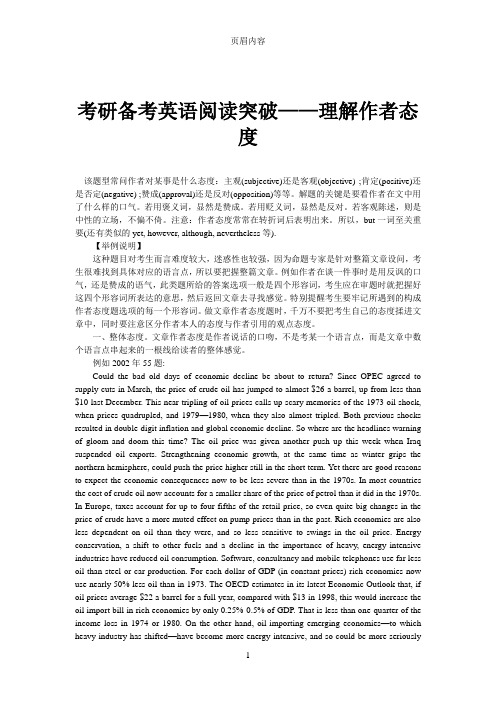
考研备考英语阅读突破——理解作者态度该题型常问作者对某事是什么态度:主观(subjective)还是客观(objective) ;肯定(positive)还是否定(negative) ;赞成(approval)还是反对(opposition)等等。
解题的关键是要看作者在文中用了什么样的口气。
若用褒义词,显然是赞成。
若用贬义词,显然是反对。
若客观陈述,则是中性的立场,不偏不倚。
注意:作者态度常常在转折词后表明出来。
所以,but一词至关重要(还有类似的yet, however, although, nevertheless等).【举例说明】这种题目对考生而言难度较大,迷惑性也较强,因为命题专家是针对整篇文章设问,考生很难找到具体对应的语言点,所以要把握整篇文章。
例如作者在谈一件事时是用反讽的口气,还是赞成的语气,此类题所给的答案选项一般是四个形容词,考生应在审题时就把握好这四个形容词所表达的意思,然后返回文章去寻找感觉。
特别提醒考生要牢记所遇到的构成作者态度题选项的每一个形容词。
做文章作者态度题时,千万不要把考生自己的态度揉进文章中,同时要注意区分作者本人的态度与作者引用的观点态度。
一、整体态度。
文章作者态度是作者说话的口吻,不是考某一个语言点,而是文章中数个语言点串起来的一根线给读者的整体感觉。
例如2002年55题:Could the bad old days of economic decline be about to return? Since OPEC agreed to supply-cuts in March, the price of crude oil has jumped to almost $26 a barrel, up from less than $10 last December. This near-tripling of oil prices calls up scary memories of the 1973 oil shock, when prices quadrupled, and 1979—1980, when they also almost tripled. Both previous shocks resulted in double-digit inflation and global economic decline. So where are the headlines warning of gloom and doom this time? The oil price was given another push up this week when Iraq suspended oil exports. Strengthening economic growth, at the same time as winter grips the northern hemisphere, could push the price higher still in the short term. Yet there are good reasons to expect the economic consequences now to be less severe than in the 1970s. In most countries the cost of crude oil now accounts for a smaller share of the price of petrol than it did in the 1970s. In Europe, taxes account for up to four-fifths of the retail price, so even quite big changes in the price of crude have a more muted effect on pump prices than in the past. Rich economies are also less dependent on oil than they were, and so less sensitive to swings in the oil price. Energy conservation, a shift to other fuels and a decline in the importance of heavy, energy-intensive industries have reduced oil consumption. Software, consultancy and mobile telephones use far less oil than steel or car production. For each dollar of GDP (in constant prices) rich economies now use nearly 50% less oil than in 1973. The OECD estimates in its latest Economic Outlook that, if oil prices average $22 a barrel for a full year, compared with $13 in 1998, this would increase the oil import bill in rich economies by only 0.25%-0.5% of GDP. That is less than one-quarter of the income loss in 1974 or 1980. On the other hand, oil-importing emerging economies—to which heavy industry has shifted—have become more energy-intensive, and so could be more seriously1squeezed. One more reason not to lose sleep over the rise in oil prices is that, unlike the rises in the 1970s, it has not occurred against the backbone of general commodity-price inflation and global excess demand. A sizable portion of the world is only just emerging from economic decline. The Economist’s commodity price index is broadly unchanging from a year ago. In 1973 commodity prices jumped by 70% and in 1979 by almost 30%.From the text we can see that the writer seems.[A] optimistic[B] sensitive[C] gloomy[D] scared本段开头用设问句引出问题,再通过严谨地分析,结合数字的对比,得出乐观的结论。
考研英语阅读理解考试题和答案解析二
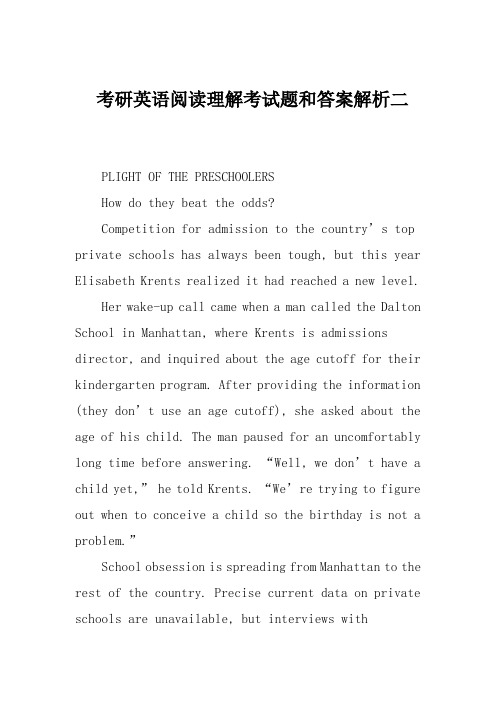
考研英语阅读理解考试题和答案解析二PLIGHT OF THE PRESCHOOLERSHow do they beat the odds?Competition for admission to the country’s top private schools has always been tough, but this year Elisabeth Krents realized it had reached a new level.Her wake-up call came when a man called the Dalton School in Manhattan, where Krents is admissions director, and inquired about the age cutoff for their kindergarten program. After providing the information (they don’t use an age cutoff), she asked about the age of his child. The man paused for an uncomfortably long time before answering. “Well, we don’t have a child yet,” he told Krents. “We’re trying to figure out when to conceive a child so the birthday is not a problem.”School obsession is spreading from Manhattan to the rest of the country. Precise current data on private schools are unavailable, but interviews withrepresentatives of independent and religious schools all told the same story: a glut of applicants, higher rejection rates. “We have people calling u s for spots two years down the road,” said Marilyn Collins of the Seven Hills School in Cincinnati. “We have grandparents calling for pregnant daughters.”Public-opinion poll after poll indicates that Americans’ No. 1 concern is education. Now that the long economic boom has given parents more disposable income, many are turning to private schools, even at price tags of well over $10,000 a year. “We’re getting applicants from a broader area, geographically, than we ever have in the past,” said Betsy Haug h of the Latin School of Chicago, which experienced a 20 percent increase in applications this year.The problem for the applicants is that while demand has increased, supply has not. “Every year, there are a few children who do not find places, but this year, for the first time that I know of, there are a significant number of children who don’t have places,” said Krents, who also heads a private-school admissions group in New York.So what can parents do to give their 4-year-old an edge? Schools know there is no foolproof way to pick a class when children are so young. Many schools give preference to siblings or alumni children.Some use lotteries. But most rely on a mix of subjective and objective measures: tests that at best identify developmental maturity and cognitive potential, interviews with parents and observation of applicants in classroom settings. They also want a diverse mix. Children may end up on a waiting list simply because their birthdays fall at the wrong time of year, or because too many applicants were boys.The worst thing a parent can do is to pressure preschoolers to perform--for example, by pushing them to read or do math exercises before they’re ready. Instead, the experts say, parents should take a breath and look for alternatives. Another year in preschool may be all that’s needed. Parents, meanwhile, may need a more open mind about relatively unknown private schools--or about magnet schools in the public system. There’s no sign of the private-school boom letting up. Dal ton’s spring tours, for early birds interested inthe 2001-2002 school year, are filled. The wait list? Forget it. That’s closed, too.By Pat Wingert Newsweek; 05/15/2000, Vol. 135 Issue 20, p76, 2/3p, 1c注 (1) :本文选自 Newsweek , 05/15/2000, p761.The author uses the examples to show __________.[A]the concern of Americans[B]the charm of the private schools[C]the fierce situation for preschoolers[D]the economic situation of American families2.What is implied in Paragraph 4?[A]The harsh way of forming a class.[B]The high expectation of the parents.[C]The wise selection of the school.[D]The difficulty of getting enrolled.3.The author ’ s attitude toward this event is __________.[A]indifferent[B]apprehensive[C]supportive[D]indignant4.Instead of giving their children great pressureto outperform, the parents should ______.[A]avoid the competition and wait for another year[B]give up their first choice and go to the unknown school[C]let their children be and do what they want to do[D]deal with the matter more casually and rethink the situation5.The text intends to express _________.[A]the popularity of the private schools[B]parents ’ worry about their children ’ s schooling[C]the plight of the preschoolers[D]the severe competition in going to school篇章剖析本文采用提出问题 --- 分析问题的模式。
考研英语真题阅读理解试题及名师解析(17)

[A] the continuing acquisition.
[B] the growing traffic.
[C] the cheering Wall Street.
[D] the shrinking market.
they do when another railroad is competing for the business.
Shippers who feel they are being overcharged have the right to
appeal to the federal government's Surface Transportation Board for
acquire one another, with Wall Street cheering them on. Consider
the $10.2 billion bid by Norfolk Southern and CSX to acquire
Conrail this year. Conrail's net railway operating income in 1996
rate relief, but the process is expensive, time consuming, and will
work only in truly extreme cases.
Railroads justify rate discrimination against captive shippers
increase their grip on the market.
2020考研英语一真题 阅读真题及解析

Text 1A group of labour MPs, among them Yvette Cooper, are bringing in the new year with a call to institute a UK "town of culture" award. The proposal is that it should sit alongside the existing city of culture title, which was held by Hull in 2017 and has been awarded to Coventry for zozl. Cooper and her colleagues argue that the success of the crown for Hull, where it brought in E220m of investment and an avalache of arts, out not to be confined to cities. Britain' town, it is true are not prevented from applying, but they generally lack the resources to put together a bit to beat their bigger competitions. A town of culture award could, it is argued, become an annual event, attracting funding and creating jobs.Some might see the proposal as a boo by prize for the fact that Britain is no longer be able to apply for the much more prestigious title of European capital of culture, a sought-after award bagged by Glasgow in 1990 and Livorpool in 2008. A cynic might speculate that the UK is on the verge of disappearing into an endless fever of self-celebration in its desperation to reinvent itself for, the post-Brexit world: after town of culture, who knows that will follow- village of culture ? Suburb of culture? Hamlet of culture?It is also wise to recall that such titles are not a cure-all. A badly run "year of culture" washes in and out of a place like the tide, bringing prominence for a spell but leaving no lasting benefits to the community . The really successful holders of such titles are those that do a great deal more than fill hotel bedrooms and bring in high-profile arts events and good press for a year. They transform the aspirations of the people who live there; they nudge the self image of the city into a bolder and more optimistic light.It is hard to get right, and requires a remarkable degree of vision, as well as cooperation between city authorities, the private sector, community groups and cultural organizations. But it can be done : Glasgow' s year as European capital of culture can certainly be seen as one of complex series of factors that have turned the city into the power of art, music and theatre that it remains today.A "town of culture" could be not just about the arts but about honouring a town'speculiarities-helping sustain its high street, supporting local facilities and above all celebrating its people and turn it into action.21. Cooper and her colleagues argue that a "town of culture" award could________[A] consolidate the town-city ties in Britain.[B] promote cooperation among Britain's towns.[C] increase the economic strength of Britain's towns.[D] focus Britain's limited resources on cultural events.22. According to Paragraph 2, the proposal might be regarded by some as________[A] a sensible compromise.[B] a self-deceiving attempt.[C] an eye-catching bonus.[D] an inaccessible target.23. The author suggests that a title holder is successful only if it________[A] endeavours to maintain its image.[B] meets the aspirations of its people.[C] brings its local arts to prominence.D] commits to its long-term growth.24. Glasgow is mentioned in Paragraph 3 to present________[A] a contrasting case.[B] a supporting example.[C] a background story,[D] a related topic.25. What is the author's attitude towards the proposal ?[A] Skeptical[B] Objective[C] Favourable[D] Critical21 C increase the economic strength of Britain’s towns这道题是细节题。
考研英语阅读理解试题及名师解析(15)
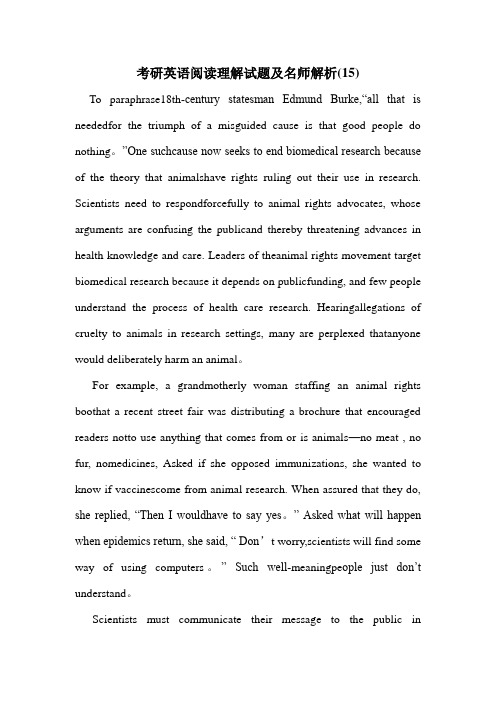
考研英语阅读理解试题及名师解析(15) To paraphrase18th-century statesman Edmund Burke,“all that is neededfor the triumph of a misguided cause is that good people do nothing。
”One suchcause now seeks to end biomedical research because of the theory that animalshave rights ruling out their use in research. Scientists need to respondforcefully to animal rights advocates, whose arguments are confusing the publicand thereby threatening advances in health knowledge and care. Leaders of theanimal rights movement target biomedical research because it depends on publicfunding, and few people understand the process of health care research. Hearingallegations of cruelty to animals in research settings, many are perplexed thatanyone would deliberately harm an animal。
For example, a grandmotherly woman staffing an animal rights boothat a recent street fair was distributing a brochure that encouraged readers notto use anything that comes from or is animals—no meat , no fur, nomedicines, Asked if she opposed immunizations, she wanted to know if vaccinescome from animal research. When assured that they do, she replied, “Then I wouldhave to say yes。
考研英语阅读常见题型归纳
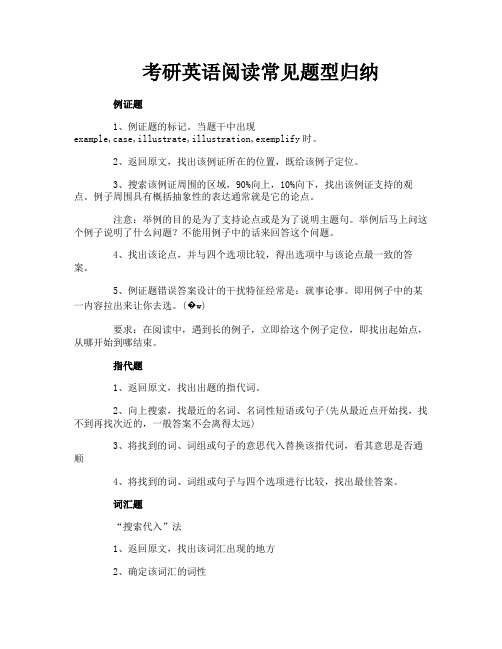
考研英语阅读常见题型归纳例证题1、例证题的标记。
当题干中出现example,case,illustrate,illustration,exemplify时。
2、返回原文,找出该例证所在的位置,既给该例子定位。
3、搜索该例证周围的区域,90%向上,10%向下,找出该例证支持的观点。
例子周围具有概括抽象性的表达通常就是它的论点。
注意:举例的目的是为了支持论点或是为了说明主题句。
举例后马上问这个例子说明了什么问题?不能用例子中的话来回答这个问题。
4、找出该论点,并与四个选项比较,得出选项中与该论点最一致的答案。
5、例证题错误答案设计的干扰特征经常是:就事论事。
即用例子中的某一内容拉出来让你去选。
(�w)要求:在阅读中,遇到长的例子,立即给这个例子定位,即找出起始点,从哪开始到哪结束。
指代题1、返回原文,找出出题的指代词。
2、向上搜索,找最近的名词、名词性短语或句子(先从最近点开始找,找不到再找次近的,一般答案不会离得太远)3、将找到的词、词组或句子的意思代入替换该指代词,看其意思是否通顺4、将找到的词、词组或句子与四个选项进行比较,找出最佳答案。
词汇题“搜索代入”法1、返回原文,找出该词汇出现的地方2、确定该词汇的词性3、从上下文(词汇的前后几句)中找到与所给词汇具有相同词性的词(如一下子找不到就再往上往下找),代入所给词汇在文章中的位置(将之替换)看语义是否合适4、找出选项中与代替词意思相同或相近的选相,即答案注意:a.如果该词汇是简单词汇,则其字面意思必然不是正确答案b.考研阅读不是考察字认识不认识,而是考察是否能根据上下文作出正确的判断。
c.词汇题的正确答案经常蕴藏在原文该词汇出现的附近。
注意不能靠单词词义直接往下推。
d.寻找时要注意同位语、特殊标点(比如分号,分号前后两句话的逻辑关系不是形式上的并列就是语义上的并列,也就是两句话的意思相同,所以可用其中一句话的意思来推测另一句话的意思从而推出所给词汇含义)、定语从句、前后缀,特别要注意寻找时的同性原则。
考研英语阅读理解观点态度题解析
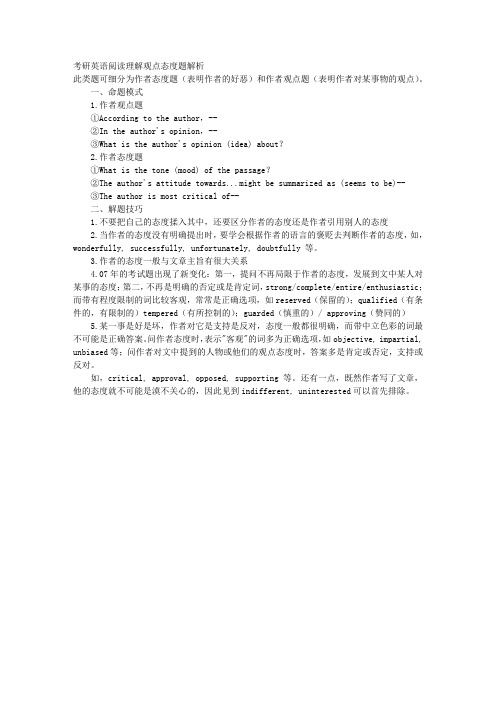
考研英语阅读理解观点态度题解析此类题可细分为作者态度题(表明作者的好恶)和作者观点题(表明作者对某事物的观点)。
一、命题模式1.作者观点题①According to the author,--②In the author's opinion,--③What is the author's opinion (idea) about?2.作者态度题①What is the tone (mood) of the passage?②The author's attitude towards...might be summarized as (seems to be)--③The author is most critical of--二、解题技巧1.不要把自己的态度揉入其中,还要区分作者的态度还是作者引用别人的态度2.当作者的态度没有明确提出时,要学会根据作者的语言的褒贬去判断作者的态度,如,wonderfully, successfully, unfortunately, doubtfully 等。
3.作者的态度一般与文章主旨有很大关系4.07年的考试题出现了新变化:第一,提问不再局限于作者的态度,发展到文中某人对某事的态度;第二,不再是明确的否定或是肯定词,strong/complete/entire/enthusiastic;而带有程度限制的词比较客观,常常是正确选项,如reserved(保留的);qualified(有条件的,有限制的)tempered(有所控制的);guarded(慎重的)/ approving(赞同的)5.某一事是好是坏,作者对它是支持是反对,态度一般都很明确,而带中立色彩的词最不可能是正确答案。
问作者态度时,表示"客观"的词多为正确选项,如objective, impartial, unbiased等;问作者对文中提到的人物或他们的观点态度时,答案多是肯定或否定,支持或反对。
206考研英语(一二)阅读理解态度题分析

2016考研:英语(一、二)阅读理解态度题分析考研英语阅读不管是英语(一)还是(二),每年都会有考察作者态度题。
英语(二)考察的第6个能力是理解作者的意图、观点或态度。
那下面我们就来谈谈如何解态度题。
首先,要学会识别态度题。
态度的标志是含有attitude或者是the author believes/seems/considers/regards等等。
选项的特征是opposition反对、suspicion怀疑的、pessimistic悲观的、approval支持、impartial公平的、objective客观的、sensitive敏感的、不能选的是biased有偏见的、puzzling迷惑的、subjective主观的、indifference冷漠。
第二,作者态度只分为三大类。
除了这3类没有任何其他态度。
如果4个选项中有2个或以上同类的选项,那肯定是错的。
正确的答案只有一个。
这三类是1)支持,赞同和乐观;2)客观,中立和3)反对,批评,怀疑和悲观。
漠不关心,令人迷惑的,有偏见的这些都不能做正确的选项。
第三,从文章中识别作者态度有以下方法:1)当没有明确作者态度的词或句子时,要特别敏锐的定位带有褒贬义或含有感情色彩的词,尤其是出现在中心句或文章主线当中如fortunately, excessively, too many一定要划出来。
2)要特别注意作者的例子,当没有找到作者态度的时候,注意作者为了表达态度的例子。
如果正反都出现,那就是中立的态度。
3)串线法,认真读首段和各段首尾句和转折处。
这样从整体上看谋篇。
能很好的看到作者的态度。
第四,要特别注意的是,最近几年的出题趋势。
1)开始不仅仅考察作者的态度,还开始考察文中某个人观点和态度是什么。
2)选项开始出现不再是态度明确的肯定或否定的词,而改为带有程度限制的词语。
比如reserved(有保留的),tempered(温和的,缓和的)因为持有保留态度的观点比较客观。
- 1、下载文档前请自行甄别文档内容的完整性,平台不提供额外的编辑、内容补充、找答案等附加服务。
- 2、"仅部分预览"的文档,不可在线预览部分如存在完整性等问题,可反馈申请退款(可完整预览的文档不适用该条件!)。
- 3、如文档侵犯您的权益,请联系客服反馈,我们会尽快为您处理(人工客服工作时间:9:00-18:30)。
考研英语阅读态度题选项
归纳
Final approval draft on November 22, 2020
一.情感态度题的词语选项一般可以分为以下几种:
1.褒义词
impartial,(公正的),rewarding(有回报的),appreciative(欣赏的),positive(肯定的,积极的),optimistic(乐观的),useful(有用的,有益的),admiring(赞赏的,钦佩的),interesting(有趣的),instructive(有益的,教育性的),enthusiastic(热心的,热情的),supportive(支持
的),support(支持),approval(赞成,承认),approving(满意的),confident(自信的,确信
的),impressed(留下印象的),reverent(尊敬的),polite(有礼貌的,文雅的)。
2.贬义词
Apprehensive(担忧的),hostile(敌对的),dubious(怀疑的),intolerant(不能容忍的),negative(否定的,消极的),pessimistic(悲观的,厌世的),subjective(主观的,个人的),disappointed(失望的),frustrated(失败的,落空的),critical(批评的),questioning(质疑的),doubtful(可疑的,不确的),compromising(妥协的),dissatisfied(不满意的,不高兴的),biased(有偏见的),satirical(讽刺的),puzzling(迷惑的),suspicious(怀疑的),gloomy(令人沮丧的),scared(恐惧的),cynical(愤世嫉俗的),oppose(反对),opposition(反对),disgust(令人反感),disgusting(令人厌恶的),worried(闷闷不乐的),depressed(沮丧的),contemptuous(轻蔑的,侮辱的),arbitrary/opinionated(武断的)。
3.中性词
analytical(分析的),apathetic(缺乏兴趣的),concerned(关心的),cautious(谨慎的,小心
的),neutral(中性的),objective(客观的),impartial(公平的,不偏不倚的),indifferent(无关紧要的),impassive(冷漠的),detached(超然的,不偏不倚的),unconcerned(不关心的),uninterested(不感兴趣的),,humorous(滑稽的,诙谐的),,disinterested(无私的),sensitive(敏感的),factual(事实的,实际的),informative(提供资讯的),persuasive(说服的),personal(个人的,),formal(正式的),informal(非正式的),casual(偶然的),
二.情感态度题常见出题位置
1.直接表达作者或者其他人态度的句子。
2.一些感情色彩较浓的词语,尤其是形容词、动词和副词等。
3.首段和末段。
4.出现转折的地方,如nevertheless,however,but,yet等。
5.文章中一些情态动词后面的内容,这些情态动词有should,shouldn’t,must,mustn’t等。
三.情感态度题正确答案选项的特点
1.很多情况下,作者只是在客观描述一种现象或是一个观点,所以objective作为正确选项的频率极高。
2.一般来说,indifferent不会正确选项,因为作者如果对一个事件漠不关心、就不会专门撰文。
另外,向cynical,disgust,desperate等词语如果出现也不会是正确选项,因为一般考研阅读理解所选的文章不会带有如此强烈的情感,如谩骂、攻击等。
3.如果作者开篇就提出了一个观点,而全文中有没有转折和对比的内容,一般来说作者对这个观点持支持态度。
4.如果作者开篇提出一个观点或者引述了别人的观点,而后文出现重要的转折,对上述观点进行批评后者否定,那么作者自己的观点往往与开头提出的观点相反。
5.如果选项中出现了一对反义词,那么正确答案往往是这对反义词中的一个,考生可以忽略其余两个选项。
6.总结历年的文章,我们发现在关于社会科学和人文科学的文章中,一般来说如果作者都会有支持的态度;在关于自然科学的文章中,作者的态度则经常是objective,analytical等。
四.情感态度题干扰答案选项的特点
1.选项没有体现作者的观点,甚至是相反的意思。
2.选项中张冠李戴,把别人的观点放到了作者头上,或者把作者的观点放到了别人的头上,要加以区分。
3.上文中提到的indifferent及其同义词和近义词等,以及包含强烈情感的词语。
五.情感态度题解题方法
1.找到直接表述作者态度的句子,对应相应的选项。
2.如果没有明确表述态度的句子,则从文章的字里行间把握文章的整体基调。
3.注意不要混淆自己的态度和作者的态度,也不要混淆作者的态度和文中其他人的态度。
